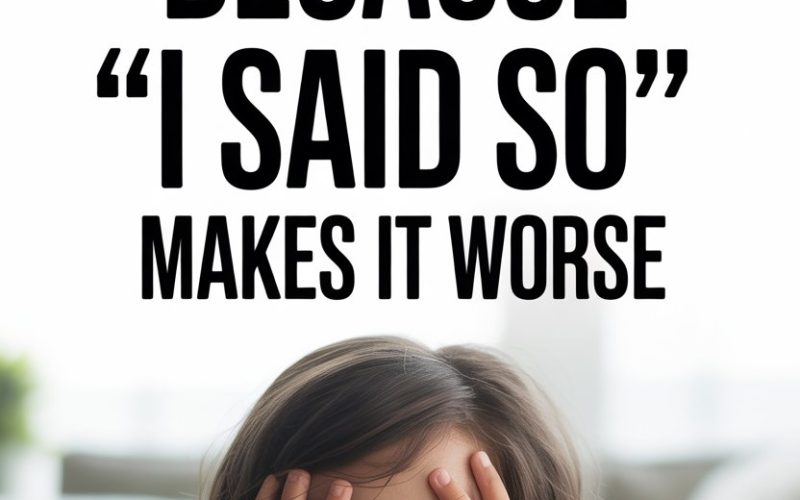Ever found yourself staring down a pint-sized negotiator who could give your estate agent a run for their money?
There you are, clinging to your last ounce of patience, when out slips the classic: “Because I said so.” Sometimes, it feels like the only thing standing between you and a full toddler mutiny.
Tempting as it is, this little phrase is like putting a sticky plaster on a leaky pipe—momentarily satisfying, but you know you’re in for trouble.
The Short-Term Win, Long-Term Pain
“Because I said so” does offer instant results.
The child may grumble or stomp, but more often than not, they’ll do what’s asked. The trouble is, you’re trading a short-term win for long-term headaches.
Experts agree that authoritarian parenting can undermine trust and damage communication. It’s a perfect recipe for resentment and power struggles that make future conflicts twice as gnarly.
You’re Not Raising Robots
Wouldn’t it be brilliant if you could just punch in your request and your child would execute it, no questions asked? (A parent can dream.) But human beings—yes, even the ones with jam on their faces—crave reasons.
Children are learning not just what to do, but why. When the answer is “because I said so,” they lose the opportunity to understand, problem-solve, and develop a sense of agency.
It’s a bit like teaching a child to swim by tossing them in the deep end and then shouting, “Because that’s how I learned!”
The Power of Explanation
Research shows that when kids are given age-appropriate explanations, they’re much more likely to cooperate.
If you tell your four-year-old, “We wash our hands so we don’t get sick,” you’re not just avoiding a single round of bathroom standoff—you’re arming them with lifelong logic.
Yes, it takes an extra ten seconds. Yes, your child might still protest. But you’re planting the seeds for better judgment down the line.
And as any weary parent knows, those sprouts matter.
Kids Learn What Power Looks Like
Every time “because I said so” comes out, a little lesson in authority is dropped into your child’s lap. The lesson? Big people get to boss little people around for no reason.
When that dynamic becomes the norm, you end up with children who either grow up feeling powerless or, sometimes, determined to seize power wherever they can (usually at the most inconvenient times).
Connection, not control, is what children crave. The late Dr. Laura Markham put it simply: Kids need empathy and boundaries, not arbitrary orders.
Otherwise, you’re not building respect, just silent compliance—or very loud rebellion.
Missing a Chance to Teach Problem-Solving
Every “why” is a chance for your child to flex their critical thinking muscles. When you cut off that dialogue, you miss the chance to teach negotiation, compromise, and empathy.
Today, it’s “because I said so” about broccoli. Tomorrow, it’s a standoff about curfew, screens, or which uni to attend.
The world is full of rules that come without explanations, but your home doesn’t have to be.
Explaining your reasoning helps kids understand consequences, helping them make better decisions when you’re not there to police every move.
The ‘Broken Record’ Phenomenon
Ever feel like you’re spouting the same phrase, day after day, like some sort of frazzled parrot? Children are wired to test boundaries—that’s literally their job.
When you rely on “because I said so,” kids aren’t learning new information, so they keep pushing, hoping for something more.
It’s a bit like pressing the “close door” button in a lift that’s not wired to anything. You push, you push, but nothing changes.
Encouraging Defiance and Sneakiness
This one’s a charmer: “Because I said so” doesn’t always squash rebellion; quite often, it just drives it underground.
When kids don’t understand the “why,” they’re less motivated to follow the rule—and more likely to work around it.
Teenagers, in particular, become experts at finding loopholes if they think a rule is arbitrary. The next thing you know, your “no sweets before dinner” decree is inspiring secret biscuit stashes behind the sofa cushions.
Better Alternatives to ‘Because I Said So’
Ready for the good news?
You don’t have to turn your living room into a daily TED Talk to ditch the phrase. Here are some swaps that get your point across—and might even save you a few headaches.
Be Honest and Brief
A quick, honest explanation works wonders. “It’s time for bed because your body needs rest for tomorrow.” No need for a lengthy podcast episode, just enough context to show you’re not acting on a whim.
Give Choices
“Would you rather brush your teeth before or after your story?” Both end with clean teeth—a win for you—but your child feels some control, and the power struggle fizzles out.
Sometimes, even a tiny choice is enough to avoid drama.
Use ‘When…Then’ Statements
“When your toys are picked up, then we can have a snack.” This approach links behaviour to outcome, showing cause and effect. It’s structured, fair, and cuts down on the “But whyyyyyy?” chorus.
Show Empathy
Keen to dodge a lecture? Try empathy. “I know you want to keep playing, but it’s time to leave. It’s hard to stop when you’re having fun.”
Acknowledging feelings doesn’t mean you’re caving—just that you see things from their pint-sized perspective.
Be Consistent
Kids aren’t daft. If the rules change with your mood or how many coffees you’ve had, they’ll notice. Clear, consistent boundaries mean fewer power struggles and less temptation to default to “because I said so.”
Sometimes, it helps to agree on family rules together, so kids feel invested. Even if they still protest, at least they know where the lines are.
Pick Your Battles
Not every hill is worth dying on. Sometimes, it’s okay to let a little thing slide, especially if you’re both running on fumes.
Save your explanations (and your energy) for the moments that matter.
When Explanations Can Wait
On rare occasions—think, child about to leg it into traffic or launch a toy at the cat—you may need to act first and explain later.
Safety trumps everything else. But outside of emergencies, a little reasoning goes a long way.
Dealing With “But Why?” Fatigue
You know those days when every sentence from your child starts with “But why?” and you seriously contemplate changing your name and moving to a remote shack? All parents get there.
It’s okay to say, “That’s a great question. I’ll answer after tea when my brain is working again.” Or, even, “I don’t know right now, but let’s find out together.”
Showing you don’t always have all the answers models curiosity and lifelong learning.
Changing the Habit—Without Guilt
If “because I said so” has been your go-to, don’t beat yourself up. Every parent has their moments. Parenting is hard enough without heaping guilt on yourself.
It’s about progress, not perfection.
Try swapping the phrase for a reason once or twice a day, and see how your child responds. Chances are, you’ll get fewer eye rolls and a bit more cooperation.
And if you slip up, there’s always tomorrow. Or the next snack time.
Raising Kids Who Listen—Even When You’re Not Around
At the end of the day, you want your kids to do the right thing for the right reasons—even when you’re not hovering in the doorway.
Ditching “because I said so” is less about making life harder for yourself, and more about raising thoughtful, resilient humans.
A child who understands your reasoning learns how to make decisions, not just follow orders.
That’s a skill that will serve them well long after the bedtime battles are done and your living room is no longer littered with tiny socks.
What Happens When You Try the Alternatives
Parents who switch to explanations and empathy report calmer households and more logical children—ones who are less likely to go full wild-child when your back is turned.
You might just find that your toddler accepts putting on shoes the first time you explain it’s raining. Or your teenager lets you know when they’ll be late, because they actually understand the reason for curfew.
You’ll still have your moments when you want to shout, “Because I said so!” from the rooftops. That’s okay.
Parenting isn’t a test you can pass or fail—it’s a lifelong practice, with as many mistakes as victories.
No Magic Words, Just a Little More Connection
“Because I said so” might feel efficient, especially when you’re running late or facing the twentieth meltdown of the day. But swapping it for a bit of reasoning, empathy, and choice-building pays off far more in the end.
Connection is the secret sauce that makes everything else a little easier. And a bit of laughter doesn’t hurt, either.
So next time your child hits you with a “Why?” and your brain is waving a white flag, maybe just give it a go.
You might be surprised at the person your little negotiator is becoming—one thoughtful answer at a time.




